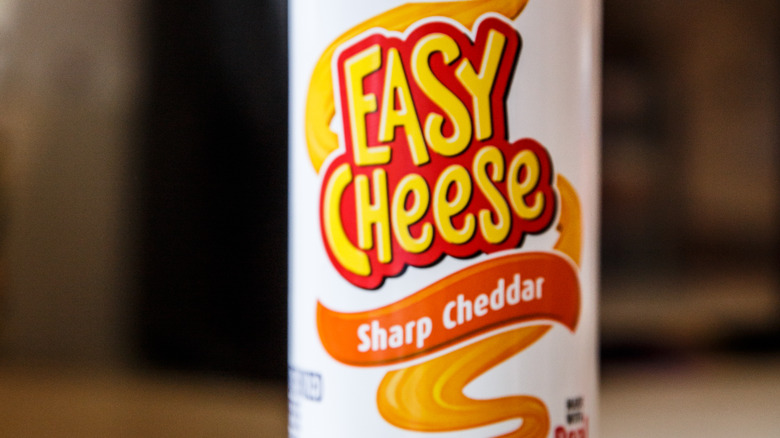The Processed History Of Canned Cheese
Processed cheese seems distinctly fake. Whether rubbery and plastic-wrapped or neon orange and squirted out of a can, it often bears little resemblance to more traditional artisanal cheeses. But in fact, not only did processed and canned cheeses emerge directly from time-honored cheesemaking practices, but they were also originally marketed as better than the real thing.
Early processed-cheese innovations began in Switzerland, but modern versions largely stem from a familiar name: James L. Kraft, a Canadian-born distributor. In 1916, he patented a process to extend the shelf-life of cheese so it could conceivably be shipped without spoiling. During World War I, Kraft's cheese was packaged in tins and shipped to soldiers overseas.
About a decade later, inspired by Kraft's work, a Swiss-American cheesemaker in upstate New York wondered if he could reduce waste in his traditional cheesemaking system. He took whey, a byproduct of cheesemaking, and reintroduced it partway through Kraft's process. His cheese cooled into a smooth block — which he named Velveeta. Soon, Kraft's company bought Velveeta and began a marketing campaign centered around health: By keeping the nutrients that would've been lost in the whey, they claimed, Velveeta was "so wholesome" and "full of health." But it wasn't until the mid-20th century that squirtable cheese-in-a-can hit store shelves.
The rise and fall of sprayable canned cheese
Invented in the 1960s and sold in tall cans, spray cheese was once a novelty. The 1960s advertisements for what was originally called Snack Mate are striking: Vibrant colors, bold taglines. The sprayable canned cheese was pitched as the ultimate convenience food, marketed as, "Instant cheese for instant parties." Nabisco offered seven flavors, from classics like cheddar to more offbeat options like shrimp cocktail and fried onion. In 1984, Kraft bought the product and renamed it Easy Cheese — and under that name, you can still buy it today.
Over the past few decades — especially as consumers have embraced wellness and clean eating as trends — Easy Cheese and other seemingly artificial foods are falling by the wayside. In the 21st century, the way people eat is changing. So today, given the additives and preservatives in its ingredient list, nutritionists say — if you care about the health value of your food — you may want to rethink eating spray cheese.

